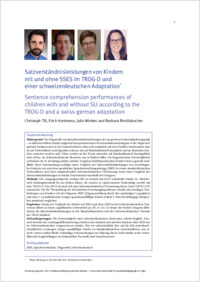Satzverständnisleistungen von Kindern mit und ohne SSES im TROG-D und einer schweizerdeutschen Adaptation
- Till, Christoph Universität Freiburg
- Hartmann, Erich Universität Freiburg
- Winkes, Julia Universität Freiburg
- Rindlisbacher, Barbara Universität Freiburg
-
2017
Published in:
- Forschung Sprache. - 2017, vol. 5, no. 1, p. 4-20
SSES
langage
compréhension
diagnostic
Suisse allemand
SSES
Sprachverständnis
Diagnostik
Schweizerdeutsch
English
Background: Certain challenges are associated with identifying children with speech comprehension disorders, as those children typically acquire compensatory strategies of communication, often resul- ting in late identification. In addition, speech therapists in the German-speaking part of Switzerland must employ assessment instruments that are designed for standard German and not for Swiss Ger- man. Those instruments are therefore executed in standard German or must be spontaneously transla- ted into Swiss German. Until now it has been unclear which of these options do the Swiss German-spea- king children justice. Aims: The aim of this study was to compare the sentence comprehension performances of monolingu- al children with and without specific language impairment (SLI) on a test designed in standard German and on a Swiss German translation of the same test. This study also compared the sentence comprehen- sion performances in both versions of the test within the groups. Methods: The sample consists of 481 children living in the canton of Bern (CH). At the time of testing, they were currently attending the grades of kindergarten up to the third grade. The children were tested with the TROG-D (Fox 2013) and with a Swiss German translation of this test. The sequence of the lan- guage versions was randomized. In the statistical analysis, children with SLI (diagnosed through speech language therapist) were matched with children without SLI. Statistical significance was tested by the cal- culation of paired t-tests. Results: The only statistically significant difference in assessment scores occurred in children with SLI compared with children without SLI, when assessed with the Swiss German translation of the test (p<.05, d=.41). The performance in standard German did not differ between groups. Within the groups, no dif- ferences between the sentence comprehension performances in standard German and Swiss German were found. Conclusions: The need for a Swiss German adaptation of the test seems questionable. However, differen- tiation of the sentence comprehension performances between children with and without SLI was only possible in the Swiss German version of the test. This result may be due to the low performance of the children without SLI in the standard German test, but there is insufficient data to confirm this possibi- lity. Further data analyses and controlled studies are needed to clarify the diagnostic issues addressed in the presented study more thoroughly.
- Faculty
- Faculté des lettres et des sciences humaines
- Department
- Département de Pédagogie spécialisée
- Language
-
- German
- Classification
- Special education
- Other electronic version
- License
- License undefined
- Identifiers
-
- RERO DOC 326860
- Persistent URL
- https://folia.unifr.ch/unifr/documents/307951
Statistics
Document views: 184
File downloads:
- TROG_1.pdf: 226
